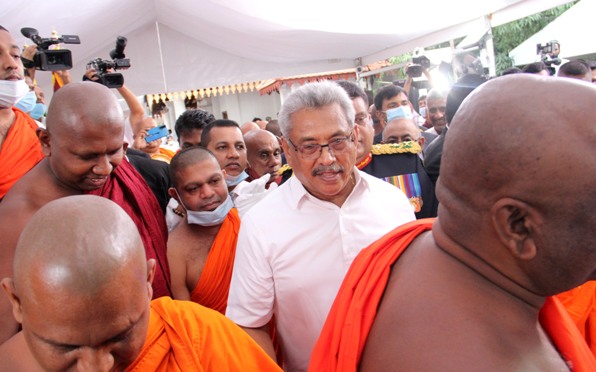By Sanjay Kumar
The proposed 20th Amendment to the Constitution has brought Sri Lanka to a crossroads of history. As recent parliamentary elections gave the ruling Sri Lanka Podujana Peramuna (SLPP) party a two-third majority, it is now trying to use a democratic mandate to dismantle the island nation’s democratic gains of the past five years.
Sri Lanka’s previous coalition government, which was elected in 2015, brought in some long-promised constitutional changes through the 19th Amendment that restored the supremacy of Parliament and curtailed overwhelming presidential powers. It gave more independence to the institutions such as the Election Commission, the National Police Commission, the Human Rights Commission, the Finance Commission, the Public Service Commission and the Constitutional Council, and gave ethnic and religious minorities representation that was more attuned to the pluralistic ethos of the nation.
The 19th Amendment was brought in by a government which consisted of people from two mainstream parties and minority groups. It was more pluralistic and representative than the present one. The previous Yahapalanaya (Good Governance) government of the United National Front (UNF), led by Maithripala Sirisena as president and Ranil Wickremesinghe as prime minister, won the mandate of the people to correct the mistakes of history committed in 1978, when executive presidency was introduced and parliament’s role was reduced to that of a handmaid.
The 1978 constitutional change led to the establishment of a majoritarian state and a gradual decline of plural and democratic space for minorities.
Political marginalization of Tamil Hindus in the 1970s led to the emergence of a violent separatist movement, Liberation Tigers of Tamil Eelam (LTTE), which only ended after decades of armed conflict, with the elimination of LTTE’s top leadership in 2009.
The end of LTTE offered a wonderful opportunity to reimagine Sri Lanka and reconcile ethnic and religious differences by expanding democratic space. The 20th amendment goes against this goal as it seeks to restore the status quo ante and revive executive presidency and turn parliament into a rubber stamp. It makes the pluralistic spirit of the 19th amendment subservient to majoritarian whims.
The SLPP rode to victory in last month’s election on the back of the majoritarian anger and fear after the 2019 Easter suicide bombings in Colombo, which claimed close to 270 lives. SLPP blamed the violence on reduced presidential powers and made it an electoral issue.
The parliamentary mandate that Prime Minister Mahinda Rajapaksa won, with 80% of the Buddhist Sinhala electorate voting for him, reflects majoritarian sentiment and fear.
In 1987, when India signed a peace deal with Sri Lanka to help it crush the violent Tamil separatist movement, it also influenced Sri Lankan leaders to introduce the 13th Amendment to the Constitution aimed at devolving power to the marginalized ethnic minority and contain its grievances. However, as the intervention of Indian Peace Keeping Force (IPKF) ended in disaster, the promised devolution of power could not take place.
And it will not happen now as the 20th Amendment is against it, as it also is against wider democratic representation.
The planned amendment is a march toward the past, not future. It is in denial of the country’s recent turbulent history and completely discounts reconciliation.
While India has always exercised moral and political influence over Sri Lanka, its own descent into majoritarian politics and systematic marginalization of religious minorities make it lose the compass it used to have to guide its smaller neighbours.
Will Colombo listen to New Delhi’s admonitions on minority rights when India is giving short shrift to its own Muslim community? Or to its rants on democratic reconciliation after the revocation of the special autonomous status of the Muslim-dominated Jammu and Kashmir?
The international community, however, needs to keep a close watch on Sri Lanka whose fragile democracy is under test again. Failure could bring a revival of its violent past.
We all know that those who cannot learn from history are doomed to repeat it.
– Sanjay Kumar is a New Delhi based journalist with experience of covering South Asia for more than fifteen years. He is the New Delhi correspondent for Arab News where this article was originally featured


